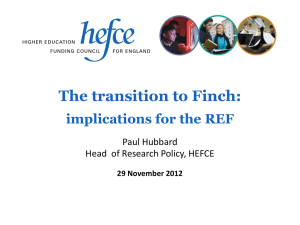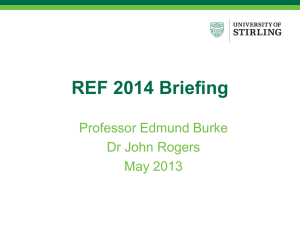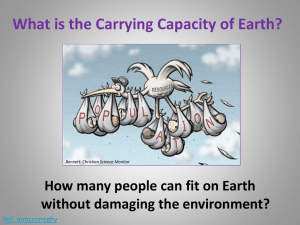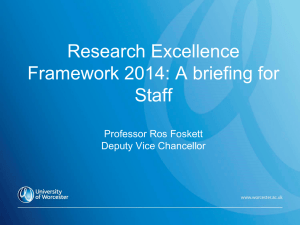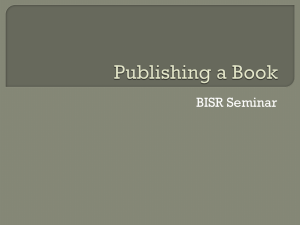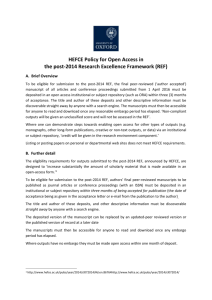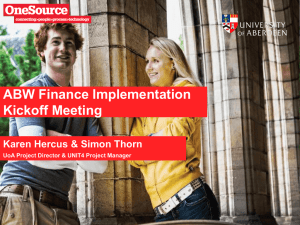REF Briefing - June 2011 - RIBM - Manchester Metropolitan University
advertisement
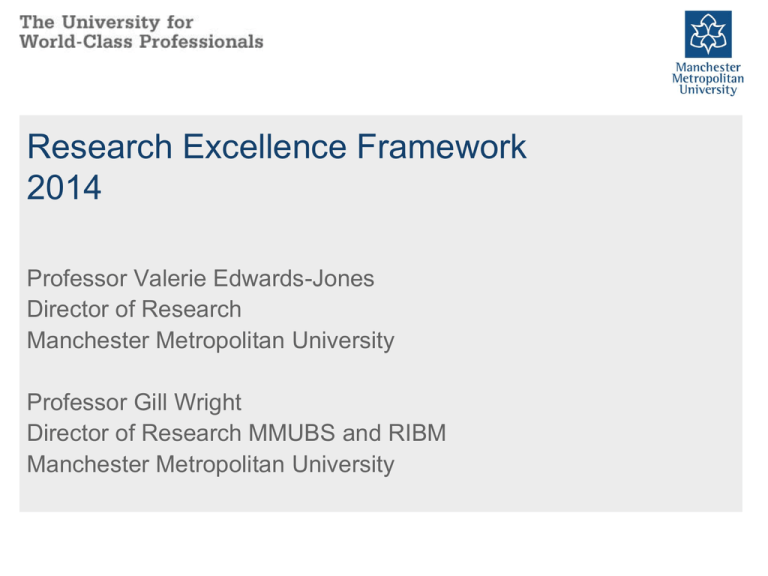
Research Excellence Framework 2014 Professor Valerie Edwards-Jones Director of Research Manchester Metropolitan University Professor Gill Wright Director of Research MMUBS and RIBM Manchester Metropolitan University The Research Assessment Exercise 2008 • 440 researchers were submitted in 17 subject areas • 78% of all research scored as internationally recognized with 12 UoAs having research considered to world leading • £6,573,721 funding per annum in QR income in 2009 • 250% increase in the funding for MMU • 47th (-55th) in England out of 129 who receive funding for research, depending upon which analysis undertaken. • Key indicator that MMU is considered research active! 2 MMU was considered 5th in the North West for Research Excellence! • • • • • • • • • • • University of Manchester (4th) University of Liverpool (18th) Lancaster University (24th) University of Salford (48th) University of Plymouth (50th)(top post 1992 University) MMU (55th) (2nd in ranking post 1992 University) University of Bradford (61st) Sheffield Hallam (66th) Nottingham Trent (67th) UCLAN (71st) Liverpool John Moores (76th). – Reference (Research Fortnight Power Ranking Analysis) Wednesday, April 08, 2015 Governors Workshop 3 Research Strategy 2010-2015 • grow research quality and volume through a Research Institute (RI) infrastructure supported by the Research, Enterprise and Development (RED) Office and Faculties. • increase income from peer reviewed sources. • engage with partners and users to maximise social, cultural, public policy, quality of life and economic impact of research internationally and nationally. • provide a strong and vibrant research environment for students and increase post graduate research student numbers. Wednesday, April 08, 2015 Governors Workshop 4 Research Institutes • • • • Reduced from ten to eight RIs All Directors appointed Full allocation of QR funding to RIs Overseen by management board and steering committee Wednesday, April 08, 2015 Governors Workshop 5 QR Income to the MMU • • • • 2008 £3.65m 2009 £6.7m 2010 £6.24 m* 2011 £ 5,6m* – *Reduced following change in allocation algorithm • All monies allocated to the research institutes on a 3:3:1model. Wednesday, April 08, 2015 Governors Workshop 6 REF 2014 • The Research Excellence Framework (REF) is the new system for assessing the quality of research in UK higher education institutions (HEIs). • The exercise will be managed by the REF team based at HEFCE and overseen by the REF Steering Group, consisting of representatives of the four funding bodies. The REF will: • inform the selective allocation of research funding to HEIs • provide benchmarking information and establish reputational yardsticks • provide accountability for public investment in research and demonstrate its benefits. Key features • The REF will be a process of expert review, informed by indicators where appropriate. • Expert sub-panels for each of 36 units of assessment (UOAs) will carry out the assessment, working under the guidance of four broad main panels. • Institutions will be invited to make submissions to each UOA. to be assessed in terms of: • The quality of research outputs – Assessed by international standards of excellence. Some of the panels -citation information to inform their review of outputs. • The wider impact of research – the features and weighting for this area of assessment still under debate, following a pilot exercise. • The vitality of the research environment REF 2014 • 36 UoA’s • 4 main panels each with a number of related sub panels – Outputs – – Environment – Impact - 65% 15% 20% http://www.hefce.ac.uk/research/ref/ 11 Research Profile • The profiles will show the proportion of submitted work at each point on a five-point scale (1* to 4* plus Unclassified). • Full details on profile not available yet but expected to be similar to last RAE. • Funding only for 3* and 4* next year (2012) HEFCE Definitions of Research Quality 4* demonstrates levels of originality, significance and rigour comparable to the best work conducted in the UK or elsewhere. Has been, or will be, recognised as making a significant or substantial contribution to knowledge, theory, policy or practice. Become, or likely to become, a primary point of reference. 3* demonstrates international standards of excellence in its originality, significance and rigour. Advanced, or is likely to advance, knowledge, theory policy or practice. It has become, or is likely to become, a major point of reference. 2* demonstrates quality that is internationally recognised in its originality, significance and rigour. Made, or will make, a contribution to knowledge, theory, policy or practice. 1* demonstrates quality that is nationally recognised in its originality, significance and rigour. It has made, or will make, a limited contribution to knowledge, theory, policy or practice. Unclassified falls below the standard of nationally recognised work, or fails to meet the definition of research. Time line • http://www.hefce.ac.uk/research/ref/timetable/ • July 2011- publication of guidance, • July 2011 - draft criteria for panels and working criteria • Autumn 2011- consultation on criteria • Jan 2012 – publication of criteria • Autumn 2012- pilot for submission criteria • Spring 2013 – declaration of interest, submissions Timeline contd • 31st July 2013- end of assessment period – (for research impacts, the research environment and data about research income and PGR students) • 31st October 2013 - Census date for staff eligible for selection • 29th November 2013 – submission date • 31st December 2013 - End of publication period – (cut-off point for publication of research outputs, and for outputs underpinning impact case studies) • December 2014 – publication of REF What has happened at MMU • Mock REF last year last year – Determine staffing mix, outputs, income • Currently compiling /evaluating impact case • More targeted REF later this year with external assessment • Systems and process development – Outputs, Pre-post award management, PGR student progression – Concordat 16 Research and Enterprise Income • Dropping – 20% last year – Success rates with grants (research council) • Restrictions by councils – ResearchResearch – Grant notifications – Grant support – European funding 17 HEFCE 2010 Pilot Exercise • 29 HEIs participating • 5 subject areas: Clinical Medicine, Physics, Earth Systems and Environmental Sciences, Social Work and Social Policy, and English Language and Literature • Institutions submitting for English included: Brunel, Cambridge, Cardiff, DeMontfort, Dundee, Exeter, Kingston, Lancaster, Liverpool John Moores, St Andrews, Manchester, Queen Mary and UCL Impact Exercise • The exercise was designed to test and develop a reliable method for assessing research impact • the findings will critically inform the final REF guidelines and instructions • Pilot impact statements and case studies were submitted by 15 March 2010, and the relevant reports were published online in November The impact agenda: the basics • Research to be assessed for its Quality and Utility • Impact defined broadly to include social, economic, cultural, environmental, health and quality-of-life benefits (but exclude ‘purely academic’ impact) • Impacts of any type and in any realm, as long as they are realised outside the academic community • extra points for demonstrating kinds of impact of which HEFCE and the expert panels have so far failed to conceive To count in REF 2014 • an impact needs to have manifested at some point during, or indeed throughout, the given time window (Jan 2008 – Nov 2013) • it must relate unambiguously and decisively to one or other aspect of a university department’s, institute’s or centre’s research. • the research that has generated the impact must have produced a formal research output at some point in the period since 1993 (to be confirmed) Reach and Significance • the two central criteria for assessing impact REACH: how widely felt it was SIGNIFICANCE: how much difference it made to the beneficiaries • how to measure and quantify impact, both in terms of the numbers benefiting and the quantum of benefit? The Impact Statement A ‘scene-setting’ inventory of all impacts generated by the research group as a whole Must explain the position of the case studies within the group’s overall research activity Unlikely to feature as a separate document in REF2014 but likely to form an integral part of the Research Environment narrative Designed to prevent the prioritisation of certain subgroups and their portrayal as representative of the group as a whole The Impact Profile 4-star exceptional: ground-breaking or transformative impacts of major value or significance with wide-ranging relevance 3-star excellent: highly significant or innovative (but not quite ground-breaking) impacts relevant to several situations 2-star very good: substantial impacts of more than incremental significance or incremental improvements that are wide-ranging 1-star good: impacts in the form of incremental improvements or process innovation of modest range Unclassified The impacts are of little or no significance or reach; or the underpinning research was not of high quality; or research-based activity within the submitted unit did not make a significant contribution to the impact UoA C19 Business and Management IMPACT WORKING GROUP David Leece Rosemary Lucas Lynn Martin Alberto Paucar-Caceres Catherine Parker Heinz Tuselmann CASES: 1 per 10 researchers, plus 1, min =2. UoA C19 Business and Management REF Impact Case Study Form Title of case study Short summary of the case study (Maximum 150 words) Underpinning research (Maximum 500 words) Provide information about the research and the specific insights that underpin the impact or benefit claimed in this case study. References to the research References to key research outputs and grants, evidence of the quality of the research (Max =10) The contribution, impact or benefit (Maximum 750 words) Describe the impact or benefit and how the research contributed to this References to corroborate the contribution, impact or benefit (max = 10) UoA C19 Business and Management Chair Professor Michael Pidd Members Professor John Arnold Professor Jan Bebbington Professor David Blackaby Professor Robert Blackburn Professor Jane Broadbent Professor Chris Brooks Professor Colin Eden Professor Paul Edwards Professor Guy Fitzgerald Professor Keith Glaister Professor Mark Jenkins Professor Martin Laffin Mr Alan Marsden Professor Kathrin Moeslein Professor Peter Naude Professor Andy Neely Ms Caroline Oades Professor Richard Thorpe Professor Ian Tonks Professor Caroline Tynan Professor Terry Williams Professor Hugh Willmott Panel Secretary Mrs Emma Calverley Lancaster University Loughborough University University of St Andrews Swansea University Kingston University Roehampton University University of Reading University of Strathclyde University of Warwick Brunel University University of Sheffield Cranfield University Durham University Formerly Arup University of Erlangen-Nuremberg University of Manchester University of Cambridge Association of Chartered Certified Accountants University of Leeds University of Bath University of Nottingham University of Southampton Cardiff University University of Hull UoA C19 Business and Management REF Information Capture Researchers: MMU HR Outputs: Digital Measures/Symplectic Money: HESA Doctoral: Faculty/RED Environment: Narrative? Impact: Working Group Cases UoA C19 Business and Management QUESTIONS? http://www.ribm.mmu.ac.uk/ http://www.ribm.mmu.ac.uk/REF/index.php
